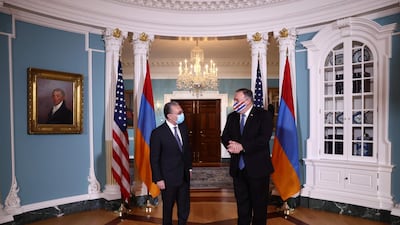Azerbaijan and ethnic Armenian forces clashed in several parts of Nagorno-Karabakh on Friday, as the United States stepped up diplomatic efforts to try to end the deadliest fighting in the mountain enclave for over a quarter of a century.
In Washington, US Secretary of State Mike Pompeo met separately with the foreign ministers of Azerbaijan and Armenia in a new attempt to end nearly a month of bloodshed that Russian President Vladimir Putin said may have killed 5,000 people.
President Donald Trump said "good progress" was being made, but didn’t say if he had spoken with the leaders of either country.
"We're working with Armenia. We have a very good relationship with Armenia ... We'll see what happens," he told reporters in the Oval Office.
Protesters carrying both Armenian and Azeri flags chanted outside the State Department on Friday.
Both ministers held separate 40-minute meetings with Mr Pompeo, who, according to the State Department, stressed to both sides the importance of entering negotiations.
Armenian Foreign Minister Zohrab Mnatsakanyan told reporters that talks were "very good" as he exited the State Department, and added that they would continue to try and reach a ceasefire.
The collapse of two Russia-brokered ceasefires has dampened hopes of a quick end to fighting that broke out on September 27 over Nagorno-Karabakh, a breakaway territory of Azerbaijan controlled by ethnic Armenians.
The international community wants to prevent a wider war that draws in Turkey, which has voiced strong support for Azerbaijan, and Russia, which has a defence pact with Armenia.
Shortly before the Washington talks were due to start, Turkish President Tayyip Erdogan told reporters in Istanbul that he hoped Moscow and Ankara could work together on resolving the conflict.
Reiterating demands for a Turkish role in mediation which has long been led by the United States, Russia and France, Mr Erdogan said: "Turkey believes it has just as much right as Russia to be involved here for peace."
Washington, Paris and Moscow have ignored such calls and Mr Pompeo accusing Ankara of fueling the conflict by arming the Azeri side. Ankara denies it has stoked the conflict.
Azerbaijan's defence ministry on Friday reported fighting in areas including territories close to the line of contact that divides the sides. Armenia's defence ministry also reported fighting in several areas and said the town of Martuni in Nagorno-Karabakh was shelled during the night. Azerbaijan denied this.
Azerbaijan has expressed concern about the security of pipelines close to the fighting used to export Azeri oil and gas, though none has been damaged.
Mr Pompeo said this week he hoped the "right path forward" could be found at the talks.
But Armenian Prime Minister Nikol Pashinyan said he saw no diplomatic resolution of the conflict at this stage, and Azeri President Ilham Aliyev has described the prospects of a peace settlement as "very remote".
About 30,000 people were killed in a 1991-94 war over Nagorno-Karabakh, which Armenians regard as part of their historic homeland. Azeris consider it illegally occupied land that must be returned to their control.
Azeri forces say they have made territorial gains, including full control over the border with Iran, which Armenia denies. Nagorno-Karabakh's ethnic Armenian administration says its forces have repulsed attacks.

